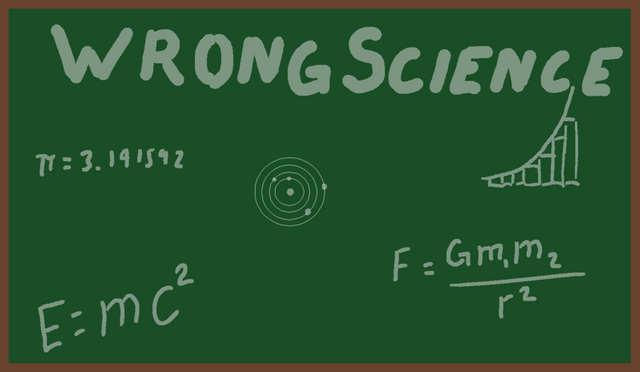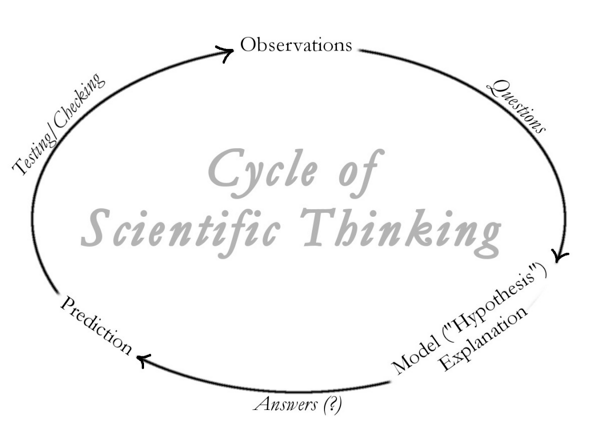
Besides being not very scientific, the scientific method doesn't work with how humans think.
We do not think in a linear method. We do not go from one step to the next. We also like to jump to conclusions. And most of the work involved in science is figuring out how to test something.

This nice looking circle just doesn't work.
We really work on all steps at once.
We often get a conclusion and work backwards, or work both ends towards the middle.
And, the rigid, uni-directional scientific method doesn't really help scientists stay on the straight and narrow. It doesn't keep them from making the biggest errors.

The "scientific" method.
- Ask a Question
- Do Background Research
- Construct a Hypothesis
- Test Your Hypothesis by Doing an Experiment
- Analyze Your Data and Draw a Conclusion
- Communicate Your Results
Straight forward, right?
Well, if you are 3 years old, and asking "Mommy, why is the sky blue?"
Else, you usually have a bunch of unanswered questions floating in your mind, and then while doing research, or observing, something clicks. And you say, "Ah ha! The sky must be blue because of the heavenly waters." (you all learned this in Bible class, right?)
But, then you think, how do we test this? No, fuckin idea. So, the question, and the conclusion goes back in the brain to gather dust until next time.
We really have no simple ideas that are easily tested, through which we can use this old jalopy of a method.
Most scientists have all kinds of ideas, questions, theories and stuff floating around in their heads. And it is only through some insight that they put some things together. They think for years, and finally stumble upon a way to test something, or a theory that finally makes sense of all the pieces.
The "scientific method" is all neat and pristine, but life doesn't work that way. The human brain doesn't work that way. It is useless except to take up a students time in college.

Errors upon Errors
The "scientific method" is useless in the most common problem in science.
We are taught many things in science class, and we accept these things as facts. And we build on top of them. Then we get unusual results, and because of the scientific method, we end up in a loop that will never get resolved, because the problem is in previous errors.
Flat earth is coming up a lot. What if you discarded the "heavenly waters", because you were told, the earth is a sphere and it is just empty space up above. And so, you were trying to answer that question, and you were getting nowhere, and then come up with an explanation that it is oxygen, in the atmosphere, that makes it blue. Well, it sorta makes sense in the ball earth world, and you can sorta show that oxygen does tint the light blue. But, if you believed in a flat earth, with a dome of heavenly waters, then your new theory makes little sense, the dome is obviously blue.
This may or may not be proved out, but there are REAL, BIG, errors in science. And these make further application of the scientific method hazardous. Like, looking for "dark matter" or the "gravity particle" or the "missing link".
These are all based on previous errors. And so, any further use of the scientific method will just compound the errors, and frustrate scientists. The "scientific method" should, at least, have a part where you analyze, is it you, or is it previous "facts"?

Peer reviewed
Peer review, the holy grail of modern science. Where the scientific method is used to format the conclusion.
Peer review is a horrible circle jerk.
In order to be a "peer", you have to get through college, and show that you believe like everyone else. If you think outside the box, you are not a peer. So, anything new and innovative is never "peer reviewed".
The review isn't really anything. Most of the time, no one ever tries the experiment again. The best the peers do is go over your math and make sure it was correct. So, basically, it is, "your friend bob" gave your paper a stamp of approval.
And then, getting published is more about the title of your paper than about any of its content.
(proved by people who were getting completely fabricated papers published)
So, the last step in the "scientific method" is usually impossible, even if you did everything right, everything according to science. We do not have a method of sharing test results that is in any way helpful to new scientists. All we have is a group of people congratulating themselves on a job well done. (and you are either in the group, and get published, or you are out of the group never to be heard from)

We are going to have to rethink all of science in these coming years as we find that most of what we thought we knew just isn't so. (think bigger changes than if the Flat Earth people are actually correct) And the big thing to change is the scientific method. We need far better tools to analyze our thinking and our conclusions.
One big thing that has to be included is that the observer affects the experiment. The double slit experiment proves this. And many more, larger (in size) experiments show that humans have a huge affect on the results gotten. So, we not only have to get better at observations, we also need to note things like our current mood, and our current expectations.
After that, we need a much better way of sharing results. It is the age of the internet, why do we still have "scientific" publications? Not only do these suffer from "peer review" bias, but they are also horribly slow. The ideas are dead by the time they get published.
So, we are going to have to really work on better science tools. And this is really important because we are about to make huge strides in science. The first one being to throw out the modern molecular physics text books.
